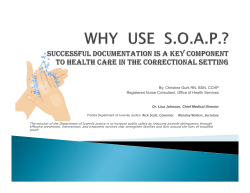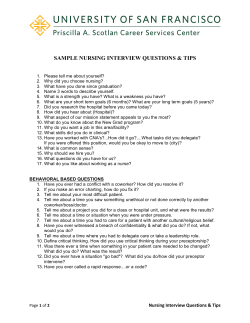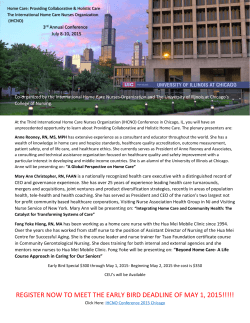
here - University of Saskatchewan Research
Capacity Building for Frontline Nurse Managers: Executive Summary Current Frontline Nurse Manger Succession Practices Frontline nurse managers are critical in establishing a high performing nursing culture through effective task delegation, the development of staff, and mentoring. In addition to clinical expertise, this demanding position requires confidence and experience in creating structure and facilitating positive outcomes while effectively managing resources. Presently, many Canadian nurses are promoted to frontline leadership mainly because of their clinical proficiency and/or seniority level and may lack the confidence and skills required to succeed in the position, especially if no additional training is provided. Consequently, frontline nursing managers are subject to high stress and burnout, which increases their potential to leave the position. Job Satisfaction for Frontline Nurse Mangers Lack of job satisfaction contributes to high burnout and turnover rates in nurse managers. To increase job satisfaction, it is necessary to focus the scope of responsibilities (reasonable number of direct reports) and provide adequate social and organizational support. Organizational support creates psychological and structural empowerment and allows managers to use their power to positively influence the unit and staff. Leadership Style and Patient Outcomes Two main leadership styles have been identified and examined in the literature: Task-oriented approach, focusing on structures and tasks; and Relational approach, focusing on people and relationships to achieve common goals. Transformational leadership belongs to the relational style of leadership and is most effective in nursing. Tranformational leaders focus on teamand relationship–building among various cohorts, staff nurses, and other health care providers. They encourage employees to envision and achieve change by building relationships that lead to empowerment, enhanced nurse satisfaction, recruitment, retention, healthy work environment, and improved patient outcomes. Transformational leaders use emotional skills to build trust through listening, empathy and responding to staff concerns. These leaders are able to retain higher numbers of competent and proficient staff, and reduce absenteeism and overtime. Resulting staff stability leads to decreased patient mortality, and fewer hospital acquired infections, medication errors, readmissions, and patient falls. About the Literature Review This expedited narrative review provides an overview of frontline nurse manager capacity building with the focus on: Current state and practices of succession planning in the field; Job satisfaction, leadership styles, and patient outcomes; Required competencies for frontline nurse management position; and Best practices for succession planning. Methods Used to Obtain Journal Articles The review consists of recent systematic reviews obtained in collaboration with field expert, Dr. Sonia Udod, assistant professor in the College of Nursing, University of Saskatchewan, who specializes in the quality of nurses’ work life, especially as it relates to nursing leadership, nurse and nurse manager roles, and nurses’ work environment. In total, there were 10 systematic reviews and syntheses of evidence Contact used to compile this review. To obtain more information about the Office of the Associate VicePresident Research – Health (UofS)/ Vice President Research and Innovation (SHR), please click here. What Makes a Competent Frontline Nurse Manager? In addition to clinical knowledge and expertise, there are a number of emerging characteristics, which are essential in developing a successful frontline nurse leader. Different nursing and leadership organizations, including the Center for Creative Leadership Research, the American Organization of Nurse Executives (AONE), the American Association for Critical-Care Nurses (AACN), and the Association of Perioperative Registered Nurses (AORN) compiled the Nurse Manager Leadership Collaborative (NMLC) model, which incorporates three domains: The science of managing the business; The art of leading people; and Creating the leader in oneself. Nursing and contemporary business literature also outlines the following necessary competencies: Nurse Manager and Leadership Competencies Personal mastery Financial management Human resource management Caring Systems thinking Staffing and scheduling Risk management Interpersonal skills Setting the vision Conflict resolution Leading employees Strategic planning Inspiring commitment Managing change Resourcefulness Being a quick learner Doing whatever it takes Building effective teams Translating vision and strategy Maintaining focus on patient and customer Table adapted from Fennimore and Wolf (2011) Effective Succession Planning Only 21% of hospitals report having succession planning process in place and overall, there is little deliberate and systematic effort made by healthcare organizations to ensure leadership continuity in key positions, such as frontline nurse management. Due to the ageing nursing population it is imperative that best practices in succession planning are consciously and strategically integrated in the organizational vision and plan. Many succession planning programs are not implemented to their full potential. Often, programs exist only on paper. There are several frontline nurse manager succession planning programs presented in the literature. However, evaluation of programs is limited and most programs fail to address all the components necessary for effective succession planning. Also, reports fail to thoroughly report the full scale of benefits, such as cost reductions and improved patient outcomes. The organization should ensure that the barriers to successful succession planning and implementation are overcome, as effective planning leads to increased organizational performance and lower staff turnover. Also, succession planning initiatives should engage all leadership levels, including the CEO (and senior leadership) and be thoroughly embedded in the organization’s vision. Strategic succession planning should incorporate the identification, recruitment, retention, development, coaching and mentoring of potential nurse leaders. Once implemented, the plan should be regularly evaluated and supported to ensure it remains viable and current. A successful frontline manager succession program should be considered as an interrelated process which incorporates a close working relationship between service delivery and academia.
© Copyright 2025









